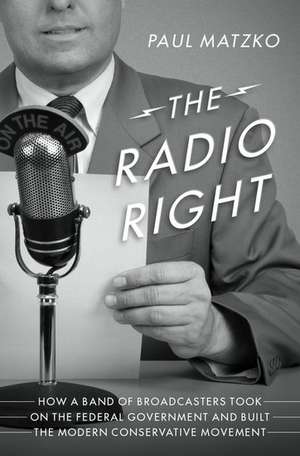The Radio Right: How a Band of Broadcasters Took on the Federal Government and Built the Modern Conservative Movement
Autor Paul Matzkoen Limba Engleză Hardback – iul 2020
Preț: 269.59 lei
Preț vechi: 316.13 lei
-15% Nou
Puncte Express: 404
Preț estimativ în valută:
51.58€ • 53.86$ • 42.69£
51.58€ • 53.86$ • 42.69£
Carte disponibilă
Livrare economică 04-10 martie
Preluare comenzi: 021 569.72.76
Specificații
ISBN-13: 9780190073220
ISBN-10: 0190073225
Pagini: 320
Ilustrații: 25 illustrations
Dimensiuni: 244 x 160 x 31 mm
Greutate: 0.54 kg
Editura: Oxford University Press
Colecția OUP USA
Locul publicării:New York, United States
ISBN-10: 0190073225
Pagini: 320
Ilustrații: 25 illustrations
Dimensiuni: 244 x 160 x 31 mm
Greutate: 0.54 kg
Editura: Oxford University Press
Colecția OUP USA
Locul publicării:New York, United States
Recenzii
Ultimately, The Radio Right provides a valuable corrective to a history of conservative American religion that too often centers on the powerful evangelical men of the 1980s and not enough on the marginalized fundamentalist women and men of the 1960s and '70s. As Matzko shows, fundamentalist efforts to establish an alternative media ecosystem bore fruit well before names like Jerry Falwell and Pat Robertson became shorthand for right wing religion, and the backlash they sparked raises timeless questions about the role of "alternative facts" and hateful rhetoric in a pluralistic democracy with a constitutional commitment to free speech, free religion, and a free press.
The Radio Right is an important history of the media's impact on politics and culture and the legacy of broadcast regulation.
Challenging the conventional wisdom of 1960s political history, The Radio Rightnot only shows how far-right broadcasters laid the grassroots groundwork for modern conservatism but also chronicles how the liberal establishment--from the Kennedy administration to the National Council of Churches--worked feverishly to fight them.
In the current climate of divisive social media and polarized cable news, it is tempting to romanticize the network era as a halcyon moment of 'fair and balanced' political media. Of course, that moment never really existed, as this wonderful, meticulously researched book demonstrates. Matzko's story ofhow the Kennedy administration pushed back against right-wing broadcasting in the 1960s helps us understand not only the past but also, importantly, the present.
In Radio Right, Paul Matzko masterfully tracks the ascent of conservative radio in the early 1960s, subsequent efforts by John F. Kennedy to quell this rising tide, and the long-term consequences of this bitter media war. Censored by liberal Democrats, radical right-wing voices cried foul, reorganized at the grassroots, then waited for their chance to fight back; we know the rest of the story. Thoroughly researched and sharply argued, this provocative and timely book is full of important (and surprising) insights that help us better understand how this nation's fourth estate evolved into the polarized and polarizing entity we find familiar today. It also challenges readers to rethink the roots and contours of political censorship and the political Right in the age of Kennedy-and Nixon, Reagan, and Trump.
The Radio Right is an important history of the media's impact on politics and culture and the legacy of broadcast regulation.
Challenging the conventional wisdom of 1960s political history, The Radio Rightnot only shows how far-right broadcasters laid the grassroots groundwork for modern conservatism but also chronicles how the liberal establishment--from the Kennedy administration to the National Council of Churches--worked feverishly to fight them.
In the current climate of divisive social media and polarized cable news, it is tempting to romanticize the network era as a halcyon moment of 'fair and balanced' political media. Of course, that moment never really existed, as this wonderful, meticulously researched book demonstrates. Matzko's story ofhow the Kennedy administration pushed back against right-wing broadcasting in the 1960s helps us understand not only the past but also, importantly, the present.
In Radio Right, Paul Matzko masterfully tracks the ascent of conservative radio in the early 1960s, subsequent efforts by John F. Kennedy to quell this rising tide, and the long-term consequences of this bitter media war. Censored by liberal Democrats, radical right-wing voices cried foul, reorganized at the grassroots, then waited for their chance to fight back; we know the rest of the story. Thoroughly researched and sharply argued, this provocative and timely book is full of important (and surprising) insights that help us better understand how this nation's fourth estate evolved into the polarized and polarizing entity we find familiar today. It also challenges readers to rethink the roots and contours of political censorship and the political Right in the age of Kennedy-and Nixon, Reagan, and Trump.
Notă biografică
Paul Matzko is a historian who specializes in the intersection of politics, religion, and mass media in modern America. He currently works at the Cato Institute as the Assistant Editor for Tech and Innovation for Libertarianism.org and is the host of the weekly podcast Building Tomorrow.
